Introduction
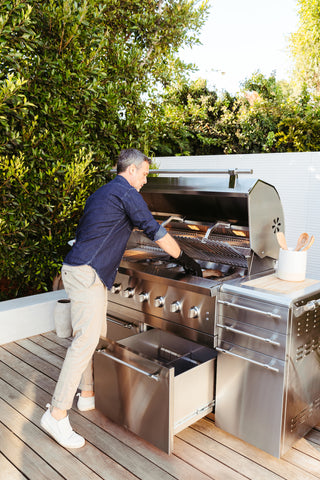
When it comes to grilling, choosing the right fuel is a crucial decision that can greatly affect your overall grilling experience. Among the various options available, natural gas and propane are two popular choices. Both fuels have their own advantages and considerations, so it’s essential to understand the key differences between them. In this article, we will compare natural gas grills and propane grills, examining their benefits, installation processes, grilling performance, costs, efficiency, and environmental impact. By the end, you’ll have a clear understanding of which fuel is best suited for your grilling needs.
Overview Of The Natural Gas Grill And Propane Grill
Natural gas grills and propane grills are popular choices for outdoor cooking. Natural gas grills are connected to the main gas supply in your home and provide a continuous fuel source. They are convenient and don’t require refueling. Propane grills, on the other hand, use propane gas stored in portable tanks. They offer flexibility and can be used anywhere. Both types of grills provide excellent heat output and temperature control, allowing for delicious grilled meals. Choosing between them depends on factors such as fuel availability and convenience. Ultimately, it’s important to consider your specific needs and preferences when selecting a grill.
Comparison Of The Key Differences Between Natural Gas And Propane
Natural gas and propane have some key differences when it comes to their use in grilling. Propane is stored in portable tanks, providing flexibility to use the grill anywhere. On the other hand, natural gas grills are connected to the main gas supply, eliminating the need for refueling. While natural gas is cheaper per unit, propane burns hotter and more efficiently, resulting in lower overall fuel consumption. The choice between natural gas and propane ultimately depends on factors such as convenience, availability, and individual preferences.
Natural Gas Grill
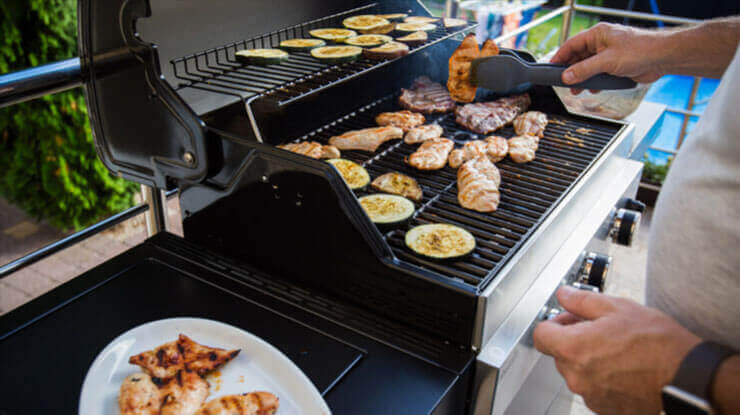
A natural gas grill operates by connecting to the main gas supply of a building or home. It offers several advantages over a propane grill. Firstly, there is no need to worry about refilling tanks as the grill has a constant fuel supply. Secondly, natural gas burns cleaner, producing fewer emissions compared to propane. Furthermore, using natural gas is more cost-effective in the long run, as it is cheaper per unit. Overall, a natural gas grill provides convenience and efficiency for grilling enthusiasts.
Advantages Of Using A Natural Gas Grill
Using a natural gas grill offers several advantages. Firstly, there is no need to worry about running out of fuel or refilling tanks, as the grill has a constant supply of gas from the main line. This provides convenience and eliminates the hassle of constantly monitoring and replacing propane tanks. Additionally, natural gas burns cleaner than propane, producing fewer emissions and creating a more environmentally friendly grilling experience. Lastly, natural gas is generally cheaper per unit compared to propane, making it a cost-effective choice for long-term use.
Installation Process And Convenience Of A Natural Gas Grill
The installation process for a natural gas grill can be more involved compared to a propane grill. It typically requires a professional to connect the grill to the natural gas line, ensuring a safe and proper installation. However, once installed, a natural gas grill offers unparalleled convenience. There is no need to worry about running out of fuel or refilling tanks, as the grill has a constant supply of gas from the main line. This allows for uninterrupted grilling sessions and eliminates the hassle of monitoring and replacing propane tanks.
Propane Grill
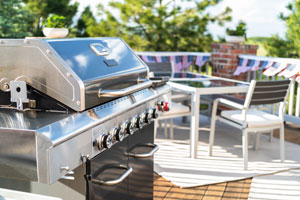
Propane grills offer several benefits for grilling enthusiasts. They are highly portable, allowing for easy transportation and use in various locations. Propane grills are also versatile, as they can provide high heat output and precise temperature control for searing, grilling, and slow cooking. The use of propane tanks makes them suitable for outdoor settings where natural gas lines may not be available. With their convenience and performance, propane grills are a popular choice for those who enjoy grilling on the go.
Benefits Of Using A Propane Grill
Propane grills offer several benefits for grilling enthusiasts. They are highly portable, allowing for easy transportation and use in various locations. Propane grills are also versatile, as they can provide high heat output and precise temperature control for searing, grilling, and slow cooking. The use of propane tanks makes them suitable for outdoor settings where natural gas lines may not be available. With their convenience and performance, propane grills are a popular choice for those who enjoy grilling on the go.
Portable And Versatile Features Of A Propane Grill
Propane grills offer the convenience of portability, allowing users to easily transport them to different locations. Whether it’s a camping trip, a backyard barbecue, or tailgating at a sporting event, propane grills are lightweight and compact, making them ideal for on-the-go grilling. Additionally, propane grills have versatile features that cater to various cooking styles. They provide high heat output for quick searing of steaks or burgers, as well as precise temperature control for slow cooking or smoking. With their portability and versatility, propane grills are a popular choice for outdoor cooking enthusiasts.
Grilling Performance

Grilling Performance:
When it comes to grilling performance, both natural gas and propane grills excel in their own ways. Natural gas grills provide consistent heat and precise temperature control, making them ideal for cooking delicate foods or achieving even searing. On the other hand, propane grills offer high heat output, which is perfect for quick searing and achieving those beautiful grill marks. Additionally, propane grills often come with features like side burners and rotisserie attachments, enhancing their versatility and cooking options. Ultimately, the choice between natural gas and propane will depend on your specific grilling preferences and needs.
Comparison Of Grilling Performance Between Natural Gas And Propane Grills
Natural gas grills and propane grills both offer excellent grilling performance, but in their own unique ways. Natural gas grills provide consistent heat and precise temperature control, making them ideal for cooking delicate foods and achieving even searing. Propane grills, on the other hand, have a high heat output, perfect for quick searing and creating those beautiful grill marks. Additionally, propane grills often come with extra features like side burners and rotisserie attachments, enhancing their versatility and cooking options.
Heat Output And Temperature Control
Natural gas grills and propane grills differ in their heat output and temperature control. Propane grills have a higher BTU rating compared to natural gas grills, which means they can generate more heat. This higher heat output is ideal for quick searing and creating those desired grill marks on your food. On the other hand, natural gas grills provide consistent heat and precise temperature control, allowing you to cook delicate foods and achieve even searing. It’s important to consider your specific grilling needs and preferences when choosing between the two fuel options.
Cost And Efficiency
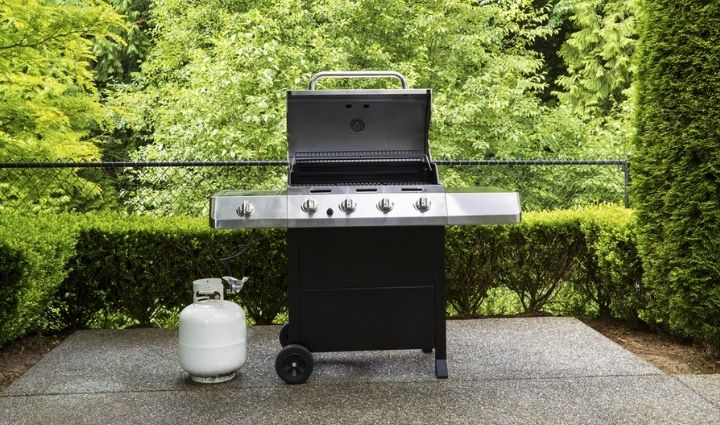
When it comes to cost and efficiency, natural gas grills have an advantage. Natural gas is generally cheaper than propane and can result in lower fuel costs over time. Additionally, natural gas grills tend to be more fuel-efficient, meaning they require less fuel to achieve the same level of heat as propane grills. This can lead to cost savings in the long run. However, keep in mind that the initial installation cost of a natural gas grill may be higher due to the need for a gas line connection.
Comparison Of The Cost And Efficiency Of Natural Gas And Propane Grills
When it comes to the cost and efficiency of natural gas and propane grills, there are a few factors to consider.
In terms of cost, natural gas is generally cheaper than propane. This means that using a natural gas grill can result in lower fuel costs over time. Additionally, natural gas grills tend to be more fuel-efficient. They require less fuel to achieve the same level of heat as propane grills, which can lead to cost savings in the long run. However, it’s important to note that the initial installation cost of a natural gas grill may be higher due to the need for a gas line connection.
Overall, if cost savings and fuel efficiency are important to you, a natural gas grill may be the better option.
Fuel Consumption And Cost Analysis
When it comes to fuel consumption and cost analysis, propane grills tend to have higher fuel consumption compared to natural gas grills. This means that propane grills may require more frequent refills or tank replacements, resulting in additional costs. On the other hand, natural gas grills have a continuous fuel supply from a gas line, eliminating the need for refills or replacements. In terms of cost, natural gas is generally cheaper than propane, making it a more cost-effective option in the long run.
Environmental Impact
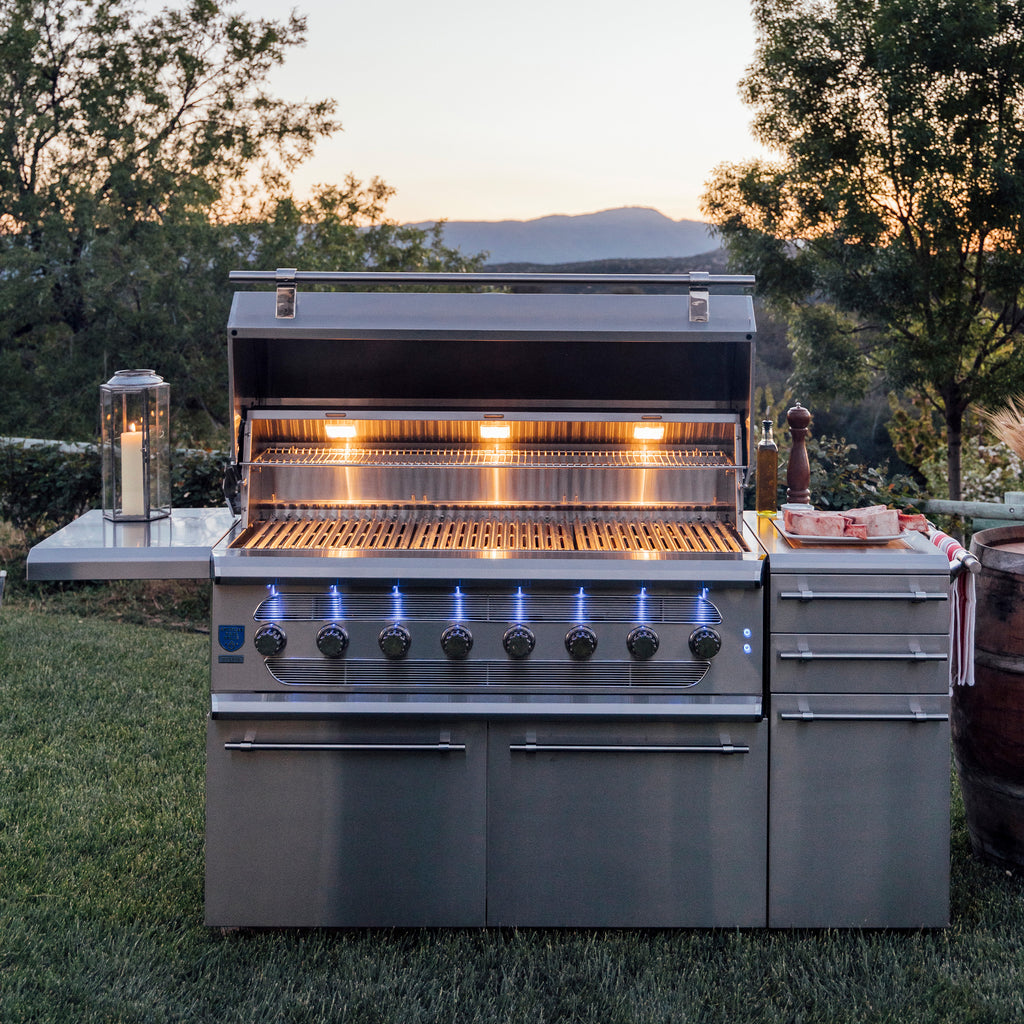
When considering the environmental impact of natural gas versus propane grills, it is important to take into account the greenhouse gas emissions and sustainability. Natural gas, which primarily consists of methane, is a potent greenhouse gas that contributes to climate change. It releases both carbon dioxide and methane when burned, and methane leakage can further exacerbate the environmental impact. Propane, on the other hand, is often considered a greener fuel option. It is important to weigh these environmental factors when deciding between natural gas and propane as grill fuels.
Environmental Factors To Consider When Choosing Between Natural Gas And Propane Grills
When choosing between natural gas and propane grills, it is important to consider the environmental impact. Natural gas is often considered a greener fuel option compared to propane. It produces fewer greenhouse gas emissions, primarily consisting of methane. However, methane leakage can still contribute to climate change. Propane, on the other hand, is a cleaner-burning fuel with lower carbon emissions. It is essential to weigh the greenhouse gas emissions and sustainability aspects before making a decision on grill fuel.
Carbon Emissions And Sustainability
When it comes to carbon emissions and sustainability, propane grills have the advantage over natural gas grills. While both fuels are relatively clean energy sources, propane emits slightly more carbon dioxide than natural gas. However, natural gas has the unfortunate tendency to leak methane, a potent greenhouse gas, into the atmosphere. This makes propane a more environmentally friendly option in terms of greenhouse gas emissions. When considering sustainability, it is important to weigh the potential impact of methane leakage and opt for the cleaner-burning fuel option.
Conclusion
In conclusion, the battle between natural gas and propane grills ultimately comes down to personal preferences and specific needs. Both fuel options have their advantages and disadvantages. Natural gas grills offer convenience for those with gas hookups at home, while propane grills provide portability and versatility. When considering grilling performance, cost, efficiency, and environmental impact, it is important to evaluate and prioritize the factors that are most important to you. Ultimately, the choice between natural gas and propane comes down to individual preferences and circumstances.
Summary Of The Differences Between Natural Gas And Propane Grills
When looking at natural gas and propane grills, it is important to consider their key differences. Natural gas grills offer the convenience of a continuous fuel supply for those with gas hookups at home. On the other hand, propane grills provide portability and versatility for grilling on the go. Natural gas grills require professional installation, while propane grills can be easily set up and used anywhere. Both fuel options have their advantages and disadvantages, so it ultimately comes down to personal preferences and specific needs.
Factors To Consider When Making A Decision On Grill Fuel
When choosing between natural gas and propane as your grill fuel, there are several factors to consider. First, consider the availability of gas hookups in your area. If you have a gas hookup at home, a natural gas grill may be more convenient. However, if you need portability and the ability to grill on the go, a propane grill may be a better choice. Additionally, consider factors such as installation requirements, cost, grilling performance, and environmental impact to make an informed decision. It ultimately depends on your specific needs and preferences.
Frequently Asked Questions about Natural Gas Grills vs Propane
1. What is the difference between natural gas and propane grills?
Natural gas grills and propane grills essentially differ in terms of fuel source. Natural gas grills are designed to be connected directly to your home’s natural gas line, whereas propane grills rely on portable propane tanks for fuel.
2. Are natural gas grills more convenient than propane grills?
In terms of convenience, natural gas grills have the upper hand. Once connected to your home’s natural gas line, you won’t have to worry about refilling propane tanks or running out of fuel in the middle of cooking. Propane grills, on the other hand, require periodic tank replacements or refills.
3. Can I convert a propane grill to a natural gas grill?
In most cases, it is possible to convert a propane grill to a natural gas grill. However, it is essential to consult the manufacturer’s instructions or seek professional assistance to ensure a safe and proper conversion.
4. Are there any safety concerns when using natural gas or propane grills?
Both natural gas and propane grills are generally safe to use if used correctly. However, it is crucial to follow safety guidelines provided by the manufacturer. It is also vital to perform regular maintenance and inspections to prevent leaks and ensure the grill is in good working condition.
5. Which type of grill produces higher heat levels?
Comparing heat levels, both natural gas and propane grills can provide similar heating capabilities. The heat output primarily depends on the grill’s construction, burners, and cooking surface. It is important to consider the BTU (British Thermal Unit) rating when choosing a grill if you are looking for higher heat levels.
6. Are natural gas grills more cost-effective than propane grills?
In terms of fuel cost, natural gas is often more cost-effective than propane. Natural gas is typically priced lower per unit than propane. However, the initial installation costs for a natural gas line connection could be higher compared to purchasing propane tanks for a propane grill.
7. Can I use a natural gas grill if I don’t have a natural gas line at home?
If you don’t have access to a natural gas line, you won’t be able to use a natural gas grill without significant modifications to your home’s gas infrastructure. In such cases, a propane grill would be a more suitable option.
8. Are natural gas grills eco-friendly compared to propane grills?
From an environmental standpoint, natural gas grills are considered more eco-friendly than propane grills. Natural gas is a cleaner-burning fuel compared to propane, resulting in lower greenhouse gas emissions.
9. Are there any restrictions or regulations on using natural gas or propane grills?
It’s important to check with your local jurisdiction for any specific restrictions or regulations concerning the use of natural gas or propane grills. Some residential areas may have regulations regarding the installation or use of natural gas lines, propane tank storage, or grill placement.
In summary, when choosing between a natural gas grill or a propane grill, consider factors such as convenience, cost, availability of fuel sources, and any specific regulations in your area. Both options provide their own set of advantages, and ultimately, it boils down to your individual needs and preferences.

Kemah Cafe is a family-owned eatery that takes pride in offering a delightful array of Vietnamese, Chinese, and Thai dishes. Located at the heart of the community, Kemah Cafe has been serving up delicious Pho and other authentic Asian cuisine for many years. Founded with a passion for sharing the flavors of the East, Kemah Cafe has become a beloved culinary destination for locals and visitors alike. The warm and welcoming atmosphere of the cafe, combined with the tantalizing aromas of freshly prepared dishes, creates an unforgettable dining experience.